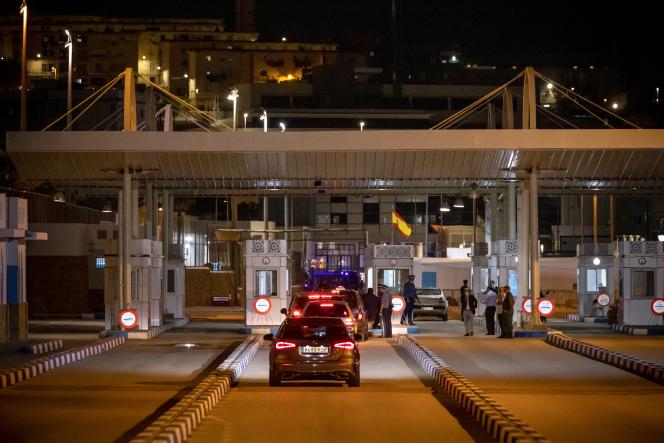The land borders between Morocco and the Spanish enclaves of Ceuta and Melilla reopened on the night of Monday May 16 to Tuesday May 17 after more than two years of closure due to the Covid-19 crisis and a diplomatic quarrel recently dispelled.
The gates of the European Union’s only land borders on the African continent opened shortly after 11 p.m. local time – midnight Spanish time (22:00 GMT) – allowing dozens of cars and queues of pedestrians to pass in both directions, noted an AFP journalist.
At the Fnideq border post, cross-border workers do not hide their joy: ecstatic smiles light up the faces of the privileged who find their families on the Moroccan side, to the sound of dinghies, in a festive atmosphere. “I was stuck for two years in Ceuta, I’m very happy to be back home,” explains Nourredine, in a hurry to finally find Moroccan soil. Moved, a sixty-year-old abounds: “I am happy that Morocco and Spain have restored their relations, it allows us to find our families. »
However, the reopening of the borders of the two enclaves, located in northern Morocco, opposite Spain, remains limited since it only concerns holders of passports and visas from countries in the Schengen zone.
Prohibit resumption of smuggling
Moroccan cross-border commuters, exempt from visas to access Ceuta and Melilla, will still have to wait until May 31 to enter. In addition, the Moroccan authorities have decided to prohibit the resumption of smuggling, tolerated until the fall of 2019 between Ceuta and the Moroccan cross-border city of Fnideq.
This traffic irrigated the local economy, but it deprived Moroccan customs of significant revenue: between 6 and 8 billion dirhams (between 550 and 760 million euros) each year. In order to put an end to it, the authorities of Rabat had closed in October 2019 the crossing points dedicated to carriers of tax-free goods between the Spanish autonomous city of Ceuta and Moroccan territory.
To compensate for the end of smuggling, the Moroccan authorities inaugurated in February 2022 an economic activity zone (ZAE) in Fnideq. This project, providing for the creation of more than 1,000 direct jobs, required an investment of 200 million dirhams (19 million euros).
The Ceuta and Melilla border crossings were closed during the first wave of the Covid-19 pandemic in March 2020. The blockage continued due to the diplomatic crisis triggered a year ago between the two neighboring countries by their dispute over the disputed territory of Western Sahara.
A spectacular Madrid turnaround
Madrid put an end to this cold snap on March 18 after making a spectacular turnaround and recognizing the autonomy plan proposed by Rabat for this former Spanish colony. The Western Sahara conflict – a vast desert territory rich in phosphates and with waters full of fish – has pitted Morocco against the Sahrawi separatists of the Polisario Front supported by Algeria for decades.
The quarrel between Rabat and Madrid, caused by the reception in Spain of the leader of the Polisario Front, Brahim Ghali, treated in a Spanish hospital in April 2021 to be treated there for Covid-19, had led to the arrival in Ceuta in May 2021 of more than 10,000 migrants in 24 hours, thanks to a relaxation of border controls on the Moroccan side.
The reconciliation sealed recently between Madrid and Rabat has made it possible to relaunch bilateral cooperation, particularly on migration issues. Maritime connections for passengers between the two neighboring countries resumed on April 12.

















